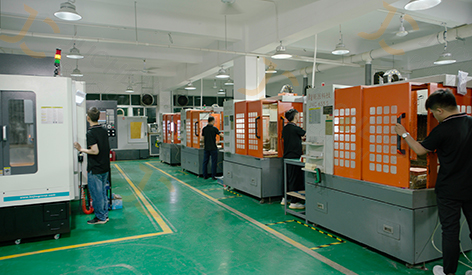ㆍPrivacy: We respect your privacy. Here you can find an example of a non-disclosure agreement. By submitting this form, you agree to our terms & conditions and privacy policy.
We use cookies to enhance your browsing experience, provide personalized content and analyze our traffic. By clicking "Accept", you agree to our use of all cookies.
Views: 5 Author: Site Editor Publish Time: 2024-04-12 Origin: Site









Introduction
Rapid precision manufacturing stands at the forefront of modern industrial prowess, seamlessly blending efficiency, advanced tools, rigorous testing protocols, and precise specifications. Unlocking its efficiency-driven methodologies, cutting-edge tools, stringent testing practices, and exacting specifications.
Dimension 1: Efficiency in Manufacturing
Efficiency is the cornerstone of rapid precision manufacturing, encompassing lean production methodologies, optimized workflows, and streamlined processes. Embracing digital technologies such as CAD/CAM systems and automation tools enhances efficiency, reducing lead times and enhancing productivity.
Dimension 2: Advanced Tools and Technologies
Cutting-edge tools and technologies power rapid precision manufacturing. High-speed CNC machines, additive manufacturing systems like 3D printers, and advanced metrology equipment ensure precise fabrication and accurate quality control, fostering a culture of continuous improvement.
Dimension 3: Rigorous Testing and Validation
Testing and validation are integral to ensuring the precision and reliability of manufactured components. Non-destructive testing (NDT), dimensional inspections, material analysis, and performance testing validate parts against specifications, guaranteeing adherence to quality standards and customer requirements.
Dimension 4: Exact Specifications and Standards
Adhering to exact specifications and industry standards is non-negotiable in rapid precision manufacturing. Precision machining tolerances, material properties, surface finishes, and geometric dimensions are meticulously controlled, meeting the stringent demands of diverse industries such as aerospace, automotive, and medical.
Dimension 5: Digital Integration and Connectivity
Digital integration and connectivity are transforming rapid precision manufacturing. Industry 4.0 technologies, including IoT-enabled machines, data analytics, and digital twins, enable real-time monitoring, predictive maintenance, and agile production strategies, driving operational excellence.
Direction 1: Lean Manufacturing Principles
Applying lean manufacturing principles optimizes resource utilization, minimizes waste, and enhances overall efficiency. Just-in-time (JIT) inventory management, value stream mapping, and continuous improvement methodologies foster lean and agile manufacturing environments.
Direction 2: Additive Manufacturing Advancements
Additive manufacturing (AM) plays a pivotal role in rapid precision manufacturing. AM technologies like selective laser sintering (SLS) and stereolithography (SLA) offer rapid prototyping, complex geometries, and material diversity, revolutionizing product development cycles.
Direction 3: Quality Assurance Protocols
Robust quality assurance protocols ensure the integrity and performance of manufactured parts. Statistical process control (SPC), failure mode and effects analysis (FMEA), and ISO certifications uphold quality standards, fostering customer trust and satisfaction.
Direction 4: Sustainability and Environmental Responsibility
Embracing sustainability practices is integral to modern manufacturing. Recycling programs, energy-efficient processes, and eco-friendly materials reduce environmental impact, aligning with global sustainability goals and enhancing brand reputation.
Direction 5: Supply Chain Optimization
Optimizing the supply chain enhances responsiveness and flexibility in rapid precision manufacturing. Collaborative partnerships, digital supply networks, and vendor management strategies streamline logistics, reduce lead times, and mitigate supply chain risks.
Conclusion
Rapid precision manufacturing epitomizes the fusion of efficiency, innovation, and quality assurance in today's industrial landscape. By embracing the eight dimensions and five directions explored in this article, manufacturers can navigate the complexities of rapid precision manufacturing, leverage advanced technologies, uphold exacting specifications, and deliver superior products that meet the evolving needs of global markets. As the industry continues to evolve, embracing a holistic approach to rapid manufacturing is paramount for sustained success and competitive advantage.

